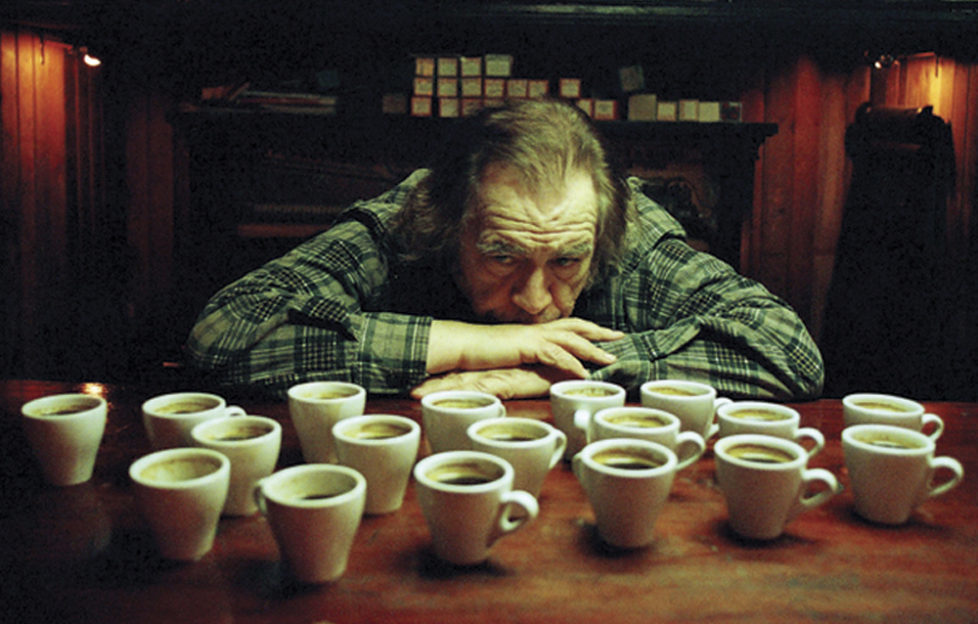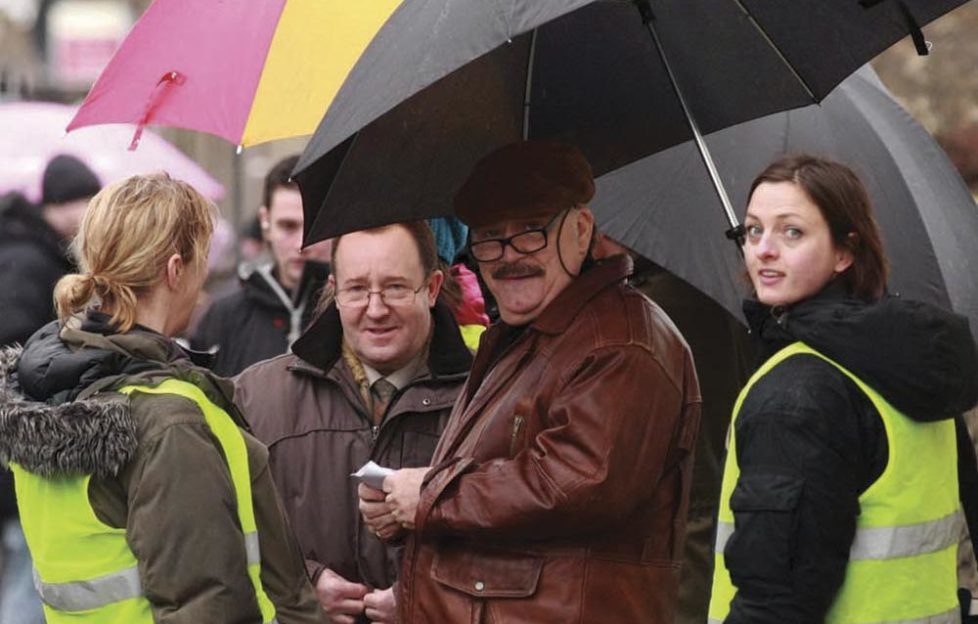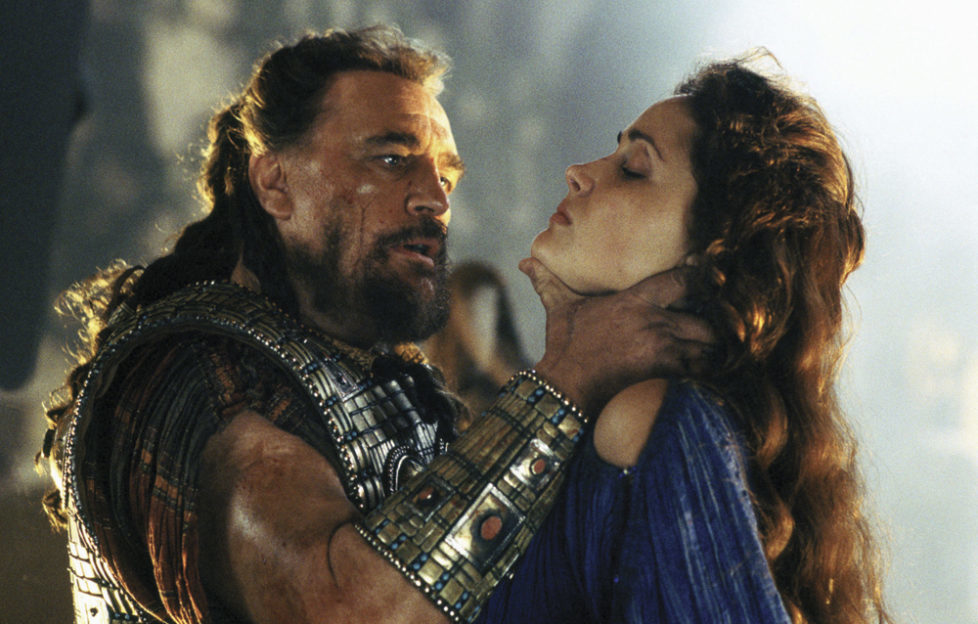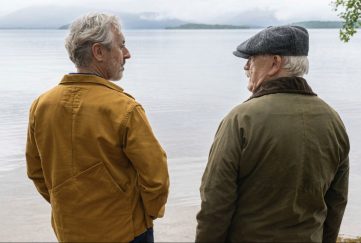Brian Cox | Homecoming
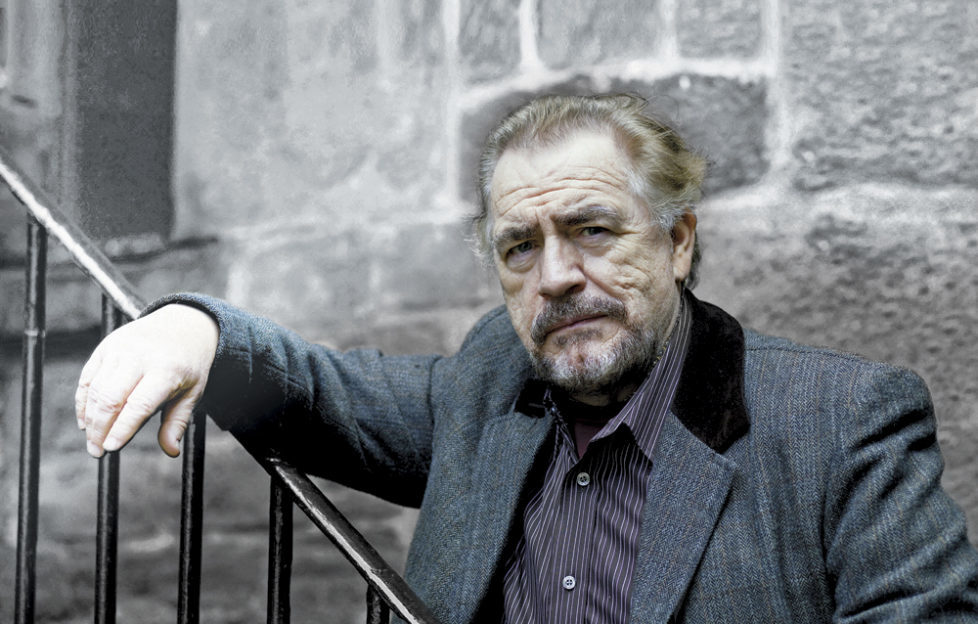
It’s difficult to know what to expect from an actor of the calibre of Brian Cox…
Meeting Brian Cox at Dundee University, where he is serving his second term as Rector, it’s natural to be in awe as you walk through a door and hear that resonant voice.
Today, Brian wears his hair black, slicked back, with a fine pencil moustache. The obvious assumption is that he’s currently playing a cad, but nothing could be further from the truth.
Although he’s posing for photographs, he extends a hand of welcome and when I inadvertently unleash a piece of Dundonian dialect, there’s a definite upturn of the moustache and a glint in his eye.
Considering his reputation as one of the world’s finest stage actors and a favourite of Hollywood movie and television directors, Brian Cox’s delight at something as simple as the quality of the early evening light, as we take a seat beside large windows overlooking the campus, is absolutely charming.
The love he has for his city is infectious
In fact the love he has for his city is infectious. The 66-year-old spends a great deal of time in Dundee – as a hands-on Rector, figurehead of his home town’s UK City of Culture bid for 2017, and filming Bob Servant, a character he has taken to like an old friend.
This wasn’t always the case. In common with many Dundonians, his heart was broken by the city fathers’ decisions to tear down old parts of the city. It’s widely acknowledged that these were acts of architectural vandalism, which left Dundee in decline for decades.
“For many years, I could never bear coming back here. I hated what they had done. I loved the old Overgate. We had a beautiful city and they destroyed it.”
City of survival
“When I did come back, however, I started to come back more often. This city is in such a beautiful spot. I’m so excited by everything that’s happening in the 21st century. They say it’s the City of Discovery but I think it’s the city of survival.”
When Brian Cox did come back, every pend and back street was familiar to him. He laughs and says it was part of his education, which had been “interesting” at best.
“I knew this place – I knew it like the palm of my hand. The headmaster would send me for messages, so I took my time and wandered around. He would send me to do things like get a stylus for his gramophone. I felt delighted as I could plunk off (play truant from) the school. I could always communicate, even if my education was a bit of a disaster.”
The irony of sitting as a university Rector isn’t lost on him. “There was no way I was ever going to university. On reflection I would have liked to have gone, but I failed my 11 plus and was consigned to the slag heap.
“I was regarded as being a bit odd. I was in a special class for villains and people who were slightly effeminate and those who were artistic. People that they didn’t know what to do with.”
Brian was just eight and the family was penniless
The youngest of five in a Roman Catholic family, his parents were in their 40s by the time he was born. His father Charles, known as Chic, ran a grocer’s shop in Charles Street, an area of great deprivation, and looked after the community by giving them “tick” (credit). Unfortunately this had serious repercussions on the finances of the shop and the family. When Chic died, Brian was just eight and the family was penniless. His mother Anne then suffered severe mental illness with many spells in the city’s Liff psychiatric hospital, where she underwent electro shock therapy.
“My big sister Betty took care of me, but she was much older and had a family of her own. Irene was the youngest next to me, about 10 years older, and she also had to try to look after me. I once wrote a note to Irene, on a Catholic Mass card, saying, ‘Irene you don’t look after me probably (sic) – I’m not going any more messages for you’.”
Until his early death, of pancreatic cancer at the age of 51, Chic had encouraged Brian’s first performances.
“I had a very happy life until my dad died. He would stand me up on the coal bunker and had me doing Al Jolson impersonations. It was my first stage, but I could tell even then the effect that performing had, so I knew from then that I wanted to do that.”
One of Brian’s earliest memories is an attempt to follow his dad to work and getting lost, even though he was only one street away from home.
“I felt horribly lost and scared – I think I even messed my pants! I did love spending time with my dad and remember some very happy times in the shop.”
Brian Cox had to become self-reliant at an early age.
“I did most things alone. I did have pals but was quite a loner. The cinema was my life at that time. The Broadway and the Royalty were my main cinemas but there were more than 20 to choose from at that time. I broke out of the Green’s Playhouse at 4am and was caught by Police! I had fallen asleep in there and woke up in the middle of the night.”
At school, despite his lack of academic achievement, teachers had taken the young Brian under their wing, recognising that he had a talent.
“I kind of knew what I wanted to do, it was just a matter of marking time. Funny thing to be marking time from the age of 11 to such time as I could be an actor.”
A teacher called Bill Dewar took a particular interest in his ambitions and suggested that Brian join the club for youngsters at Dundee Rep. This was Brian’s first experience of live theatre – until then it was seen as a middle-class pursuit. Here he had his eyes opened to a new world – and he liked it.
An opportunity opened up at the Rep for what Brian calls a “general factotum”. At 14 Brian left school, earned £4 a week and started to learn his trade.
“It was amazing. People in the theatre community are open and non-judgmental. A woman called Bunty Kidd gave me a hard time, which I needed. I was pretty uncouth and arrived with a strong Dundonian accent, but she was good for me.”
As the interview progresses Brian’s accent drifts back. His first job was to deposit the takings at the British Linen Bank in the High Street every day – “they trusted me not to run off with them”.
It was the greatest apprenticeship he could have wished for
From seeing backstage fights between actors and directors to watching the productions, this was the greatest apprenticeship he could have wished for.
By the time the building was consumed by fire on Brian’s 17th birthday he had also been acting in productions with journalist friends, with one production of Under Milk Wood directed by George Rosie.
However, London and drama school called and by the age of 19 he was at the Lyceum in Edinburgh, followed by a year at Birmingham Rep. By 21 he had played roles such as Mercutio in Romeo and Juliet, Lago in Othello, Orlando in As You Like It, and Peer Gynt.
Brian Cox’s first television role was in 1965, which he remembers fondly, for many reasons.
“My mum got a book together and was gathering signatures from the neighbours. The idea was to send it to the BBC as a petition to get me back on the telly,” he laughs. “I said, ‘Mum, I’m really touched, but it really doesn’t work like that…’ and she said, ‘Oh well, just an idea.’”
She did live to see her son’s first big screen role as Trotsky in Nicolas and Alexandra in 1971. “They gave me these pebble glasses,” he laughs, “and I couldn’t see a thing. If you look at it closely you’ll see me fumbling for the door handles!”
This wasn’t the beginning of a glorious film career. His stage reputation went from strength to strength, but film roles were rare until his now legendary performance in Manhunter in the mid 1980s. In only 10 minutes of screen time he created the first, and in many opinions the most chilling and convincing, Hannibal Lecter.
Brian’s comedic side
Since then his film and TV career has included villains in the extreme, including an Emmy-winning performance as Herman Goering in Nuremberg. But it has been a man with a personality closer to home that has allowed him to explore his first love of comedy.
“I always loved physical performers like Jerry Lewis, Red Skelton and Danny Kaye, but I’ve always got the baddies! So with Bob Servant, it has been a joy, particularly with my sidekick Frank which has turned into a Dundonian Laurel and Hardy. Bob is based on my brother Charlie who also had a shop. He would do things like tell someone he didn’t have any change but offer them a carrot and a cabbage instead!”
Now happily married with two young sons joining his adult children from a first marriage, Brian Cox is balancing his need to perform with love of family and his home city.
“I have diabetes and need to be very careful, but sometimes I’m not,” he says. “Once I went to a doctor in a street in Dundee called Arthurstone Terrace. I looked out the window and saw the window where I first saw the light of day in Brown Constable Street. I went away, but I’ve truly come back.”
Interview with Brian Cox originally published in The Scots Magazine, 2015. For more great interviews pick up the latest issue of The Scots Magazine. In the shops now or order online by clicking here.
- In The Good Heart, 2009
- Brian Cox filming Bob Servant in Broughty Ferry
- Starring in the film Troy


